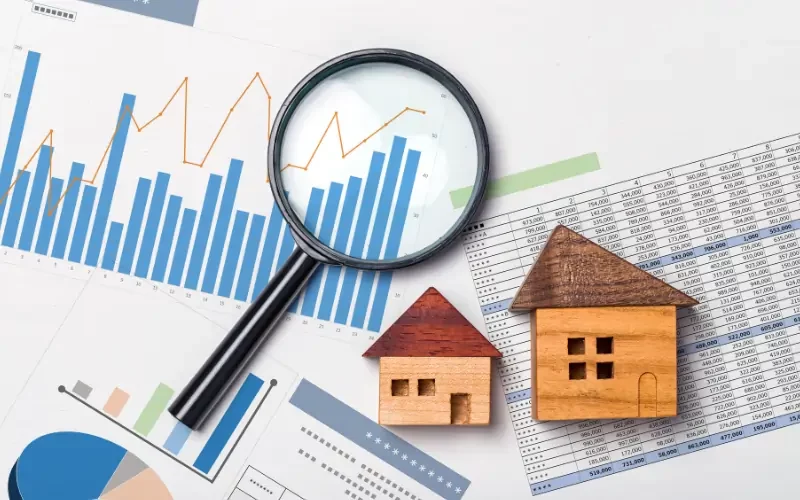
Property owners in Georgia need to understand the distinction between assessed value and market value, particularly when it’s time to pay property taxes. It’s also a critical distinction for anyone looking to enter the local real estate market, either by selling or buying.
Local governments and tax assessor’s office officials use one number for property tax purposes, but the real estate market will often rely on wildly different figures for fair market values.
That’s why we’ve put this guide together for you.thisn we’llg to break down what each one is in plain terms and show you how they’re calculated. Then, we’ll talk about why the obvious gap between the two can impact everything from your tax bill to the bottom line in a home sale. Although if you’re in a bind and just need to sell your house fast, talking with a cash buyer may be the way to go.
What is Assessed Value?
The assessed value of a home is the dollar figure that the tax assessor for your local government assigns to your real estate for property taxation. It’s not meant to reflect the potential sales price of your home, or even a close analog for your home’s market value. It’s only to create a baseline to calculate property taxes.
In most cases, the tax assessor looks at things like your home’s square footage, property features like a garage, and the overall property condition. Sometimes, recent sales of comparable properties in the local market are also factored in on a subjective basis.
You then multiply the total assessed value by the tax rates set by your local government, school district, and county to determine your tax levy. Your tax levy is what creates your annual tax bill. Keep in mind that assessed values can be modified for new construction or properties needing extensive repairs, or to account for drastic changes in market conditions. They vary widely based not only on state law, but how local government officials interpret that law and the data that’s collected.
What is Market Value?
Market value is much different than assessed value. Where assessed value is the foundation of property taxation, current market value (or fair market value) is representative of what your home could sell for in today’s open market. The market value of a home is a property value that is derived from comparable homes or similar properties in the same neighborhood that have recently sold.
Market values are influenced by various economic factors, recent sales, the condition of the property, and the overall current real estate market. Unlike the assessed value, the market value is a complex dynamic with countless variables created between property owners and buyers. A professional appraiser or an experienced real estate agent can help you accurately ballpark this number with a comparative market analysis.
Market value plays a central role in real estate transactions, mortgage approvals, and pricing strategies. It’s a significant factor for anyone considering selling, since a home’s market value often ends up being higher (or lower) than the same home’s assessed value.
Key Differences between Assessed Value and Market Value
The biggest difference between assessed and market value is the way each number is used. Assessed values are determined based on legislative or municipal criteria, and they’re only used for the purposes of calculating property taxes. Market value is a closer representation of the real estate property values that would be involved in a sales transaction.
The market value is the amount someone would reasonably pay for your home. The assessed value will determine their property taxes for as long as they live there.
Can a Market Value be Higher than the Assessed Value?
Absolutely. In a strong local real estate market, with high demand and limited inventory, market values will typically skyrocket. This is a seller’s market. This means you’ll almost certainly be able to sell your home for substantially more than your most recent tax bill would suggest. If you feel like you’re stuck between the two numbers, looking into a fast cash sale might help simplify things.
Can an Assessed Value be Higher than the Market Value?
It happens, especially when a property needs extensive repairs or the local market has slowed. In those cases, the assessed value may not match the fair market value, leaving sellers frustrated.
If you’re experiencing a mismatch like this, it could be a long time before market forces allow your home’s value to return, or it could stretch out the selling process with lengthy negotiations. If the reason is do to the property condition, it’s going to take some serious consideration to determine if it’s worth it, to you, to take the time and money needed to bring the property back to a more desirable condition. In some cases, it may not even be feasible.
How Georgia Determines Property Taxes
In Georgia, real and personal property taxes are based on a home’s assessed value, which is typically 40% of the fair market value, according to state guidelines. Local tax assessors’ offices set this number, and once the total assessed value is set, the county clerk’s office, school district, and similar local entities apply their tax levies and tax rates to arrive at the final tax bill.
The Role of Appraised Value in the Home Selling Process
During the homebuying process, lenders and buyers often request a professional appraiser to determine the home’s appraised value. This figure is not the same as the assessed value used for property taxation, and it doesn’t always match the fair market value either. Instead, it’s the appraiser’s estimate of your home’s worth in the current real estate market.
Mortgage lenders use the appraised value to decide how much they’re willing to finance. This alone can have a dramatic effect on the selling process. If the appraisal is lower than the asking price, the sale could fall through unless the seller agrees to lower their price as a concession.
How Property Valuation Affects Your Taxes, Pricing, and Mortgage Options
Your home’s value affects several areas of ownership. It determines how much you pay in property taxes, the price buyers are likely to offer, and the mortgage amount a lender is willing to approve.
If the assessed valuation is set too high, your tax bill may increase unnecessarily. If the fair market value in the current real estate market is strong, you may benefit from higher offers when selling.
Lenders also rely on the appraised value when deciding how much financing to provide. If the appraisal comes in below the agreed-upon asking price, a buyer may need to renegotiate or cancel the deal. These three figures work together to shape your tax implications, your selling power, and your financing options.
Knowing how this is all calculated and applied helps property owners make clearer financial decisions and avoid surprise setbacks.

Factors That Influence Your Home’s Value in Georgia
There are a bunch of factors that impact how a property value is determined. There are all of the typical things you’ll see on a real property listing, like square footage, layout, and property features like new roofs, pool, or solar equipment.
The condition of the property is critical. If there are signs of water damage, visibly outdated systems, or obvious wear can significantly reduce the fair market value and the assessed values placed on the property by the county clerk’s office. The flip side of that coin is that new construction or recent renovations can usually boost the value of a home.
There are also a range of external factors nearly beyond count. Economic factors, the current market, and recent sales of similar properties can all impact value estimates heavily. Changes to the neighborhood, like new schools, better roads, a lower tax rate, or surging demand, can all push property values higher as well.
How to Maximize Market Value Before Selling Your Georgia Home
If you’re getting ready to sell your home in Georgia, here are a few quick tips for getting the most bang for your buck. Start with curb appeal. Fresh landscaping and clean entryways create strong first impressions.
Inside, handle minor repairs that might otherwise get put off for distant weekend to-do lists. Little touches can make a big difference. Address outdated fixtures, replace worn flooring, or complete extensive repairs if your budget allows.
Be sure you’ve handled your comparative analysis before this stage as well. You’ll want to make sure you’re pricing your residential property wisely, so that you’re not risking having to reduce it later, but also not taking bottom dollar just to grab a sale.
Conclusion
In Georgia, the difference between assessed value and market value can influence your property taxes, your tax bill, and the offers you receive in today’s real estate market. As long as you know how each is determined, you’ll be prepared to make more informed property decisions. From preparing to sell to reviewing your records for taxation, knowing your home’s true worth is always a wise move. If you’d like to get a cash price for your home, reach out for a no-obligation offer, and make life simpler.
